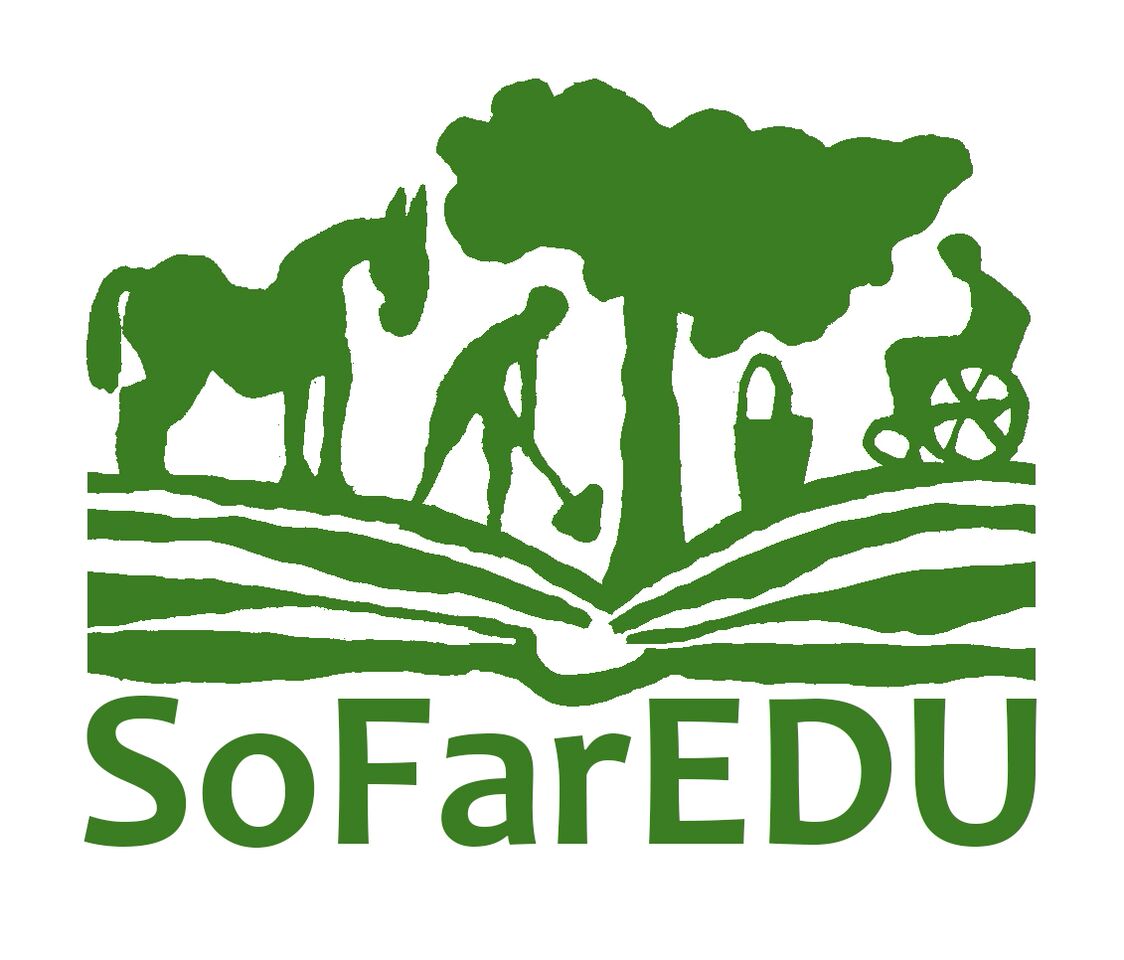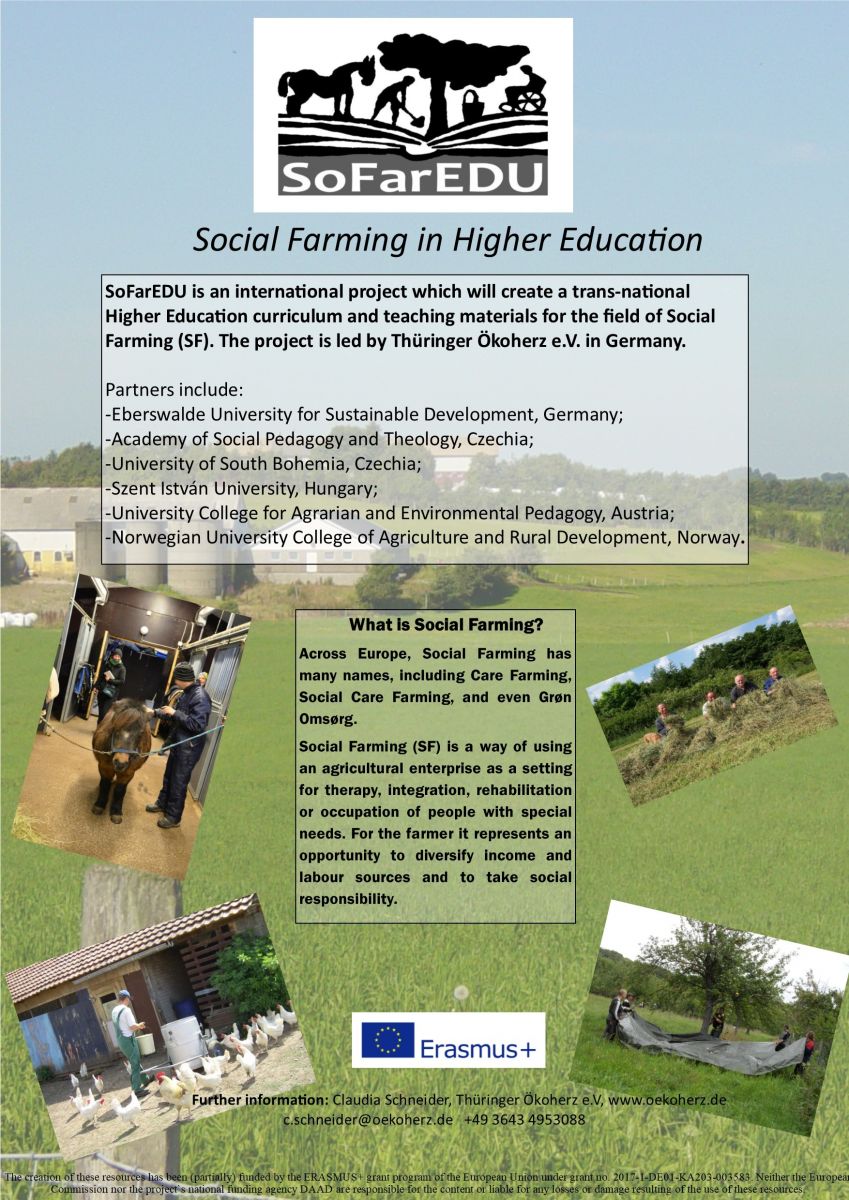Szociális farm képzés a felsőoktatásban

Szociális farm képzés a felsőoktatásban (SoFarEDU: Social farming in Higher Education)
Pályázat típus: Erasmus+ KA2 Stratégiai partnerség
Témavezető: Dr. Ujj Apolka egyetemi adjunktus MKK Természetvédelmi és Tájgazdálkodási Intézet, ujj.apolka@mkk.szie.hu
Pályázat azonosító: 2017-1-DE01-KA203-003583
Projekt célja: A három éves projekt célja a szociális gazdálkodás MSc képzés struktúrájának kidolgozása mellett új oktatási tartalom létrehozása és terjesztése azokban az országokban és régiókban, melyek még nem ismerik és nem aknázták ki a szociális farmok társadalmi hasznait. Az MSc szintű képzés tanmenetéhez illeszkedő oktatási tananyagok a képzésben résztvevő oktatók munkáját is segítik, hogy a képzés során a hallgatók minél alaposabban megismerjék a szociális farmok működésének és működtetésének elvét, előnyeit, a benne rejlő lehetőségeket, gazdasági vonatkozásait, és nem utolsó sorban a fenntarthatóság követelményeit.
A 2017. szeptember 1-én indult a SoFarEDU projekt konzorciumvezetője a Thüringer Ökoherz e.V. TÖH (Németország). A konzorciumvezetőn kívül a SZIE további projektpartnerei a következők: Eberswalde University for Sustainable Development HNEE (Németország), University of South Bohemia USB (Csehország), Academy of Social Pedagogy and Theology JABOK (Csehország), University College for Agrarian and Environmental Pedagogy UCAEP (Ausztria), Norwegian University College of Agriculture HLB (Norvégia).
Projekt honlapja: www.sofaredu.eu
Erasmus+ Strategic partnership for Social Farming in Higher Education
What is Social Farming?
Social Farming (SF) is a way of using an agricultural enterprise as a setting for therapy, integration, rehabilitation or occupation of people with special needs. For the farmer it represents an opportunity to diversify income and labour sources and to take social responsibility.
Why Social Farming in Higher Education?
In recent years an increasing number of farmers and social workers are becoming interested in SF as a new branch of a farming or social enterprise. However, neither agricultural nor socio-educational university courses are able to respond sufficiently to this trend. In most European countries, only a few pioneering projects offer further education at university level. SF is interdisciplinary -- agricultural knowledge, management skills, as well as socio-educational competences are necessary. Thus, SF is based on different professions which have had very little contact so far.
There is a high demand for scientific research as well as educational innovations and teaching material supporting SF. Subjects such as Agriculture, Social work, Psychology or Forestry can benefit from offering knowledge and skills needed for running a social farm, as more and more of their members will encounter it in the future.
What are our project aims?
The project consortium aims at empowering rural communities and rural economies across Europe by increasing the quantity, and above all, the quality of social farms. This outcome will be realised by giving universities the tools to teach the necessary SF skills by defining Quality Standards in teaching SF, followed by developing a Curriculum on SF in Higher Education, and especially by offering teaching material tailored to the needs of various target groups, education about SF will be greatly improved.
Project duration: September 2017 - August 2020
Project partners:
- Thüringer Ökoherz e.V. Organic Farmers and Environmental Association, Germany (coordinator)
- Eberswalde University for Sustainable Development, Germany
- Academy of Social Pedagogy and Theology, Czech Republic
- University of South Bohemia, Czech Republic
- Szent István University, Hungary
- University College for Agrarian and Environmental Pedagogy, Austria
- Norwegian University College of Agriculture and Rural Development
Project website: www.sofaredu.eu
Project number: Erasmus+ 2017-1-DE01-KA203-003583
Further information in Hungary:
Apolka Ujj PhD
Szent István University, Faculty of Agriculture and Environmental Sciences
Gödöllő 2100, Páter K. u. 1.
+36 28 522 000 / 2262



